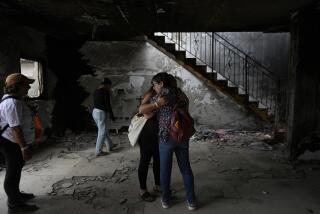Israeli Jews See Miracles in This War : Religion: Some believe the Messiah’s coming is at hand. And others point to new meanings for biblical prophecies.
JERUSALEM — At night, said the elderly watchman, when the air raid siren catches believers praying out in the open before the Western Wall, they do not run for shelter. They dance.
“God is the savior,” said the guardian of Israel’s holiest Jewish site, the rise of white stone blocks that were once part of the great temple built by King Solomon. “They ask for mercy and, because of that, the missiles explode in the air.”
Israel’s tens of thousands of ultra-Orthodox Jews have shared the national trials of the past weeks, entering their sealed rooms and donning their gas masks when the sirens sound. However, they have perceived them differently, through the prism of their religious beliefs.
Among the myriad Jewish sects, some see the Gulf War as a sign that the Messiah’s coming is at hand. Others announce that the amazingly low death toll from Iraqi missile attacks on Israel is proof that miracles still happen. And some point to new meanings for biblical prophecies.
The crisis has brought no reported surge of new believers, but for those already used to seeing signs of divine will in life’s events, God’s handiwork has been on special display ever since Iraq invaded Kuwait in August.
Rabbi Mendel Weinbach, dean of the Ohr Somayach yeshiva, a school in Jerusalem, said the fact that Iraqi President Saddam Hussein chose to invade Kuwait instead of concentrating his attack on Israel could already be considered a miracle with parallels in the Bible.
Quoting a medieval Jewish commentator, he said that the greatest miracle in Exodus was not the 10 plagues that God brought on Egypt. It was the Pharoah’s decision to chase the escaping Jews into the Red Sea, bringing on his own death because God had clouded his judgment.
Now a special prayer, added since the war began, is said at midday services at the Western Wall and in Israeli synagogues. It asks God for similar help to “destroy the counsel of our enemies.”
Israeli media reported that one group of 10 Jewish mystics in the ultra-religious Meah Shearim quarter of Jerusalem actually attempted to revive an old cabalistic cursing ritual known as the pulsa denura (lashes of fire) against Saddam Hussein.
The ritual, which uses black candles, has been either discounted or denounced by most who are ultra-Orthodox, and the latest Israeli press report said the cursers were worried that if it had been done improperly, it could boomerang on them.
Weinbach dismissed reports of cursing ceremonies and the new approach of the Messiah. He said most highly religious Jews simply responded to the stress of the attacks with more peace of mind than their secular counterparts.
“The way a religious Jews looks at this is that every bullet or missile has its address on it, but it’s heavenly design,” he said. “So you do everything to protect yourself, but you don’t get frantic.”
Weinbach said that, according to official reports, among the hundreds of people hospitalized for severe anxiety and stress during the missile attacks, very few had been ultra-Orthodox.
Hersh Akiva Schaefer, a yeshiva student, said he and his wife recited psalms together during the attacks or discussed biblical passages to take their mind off the situation, thus staying calm.
Lyle Wexler, an Ohr Somayach student originally from Minneapolis, said he would surely have been “freaking out” if it were not for his faith.
“How religion comes into play is that you accept that everything is ultimately for the good,” he said.
The Lubavitch sect of Hasidic Jews appeared to take the most optimistic view of the crisis, with its leader reportedly predicting early on that there would be few injuries and with rumors spreading among his followers that the Messiah is due to arrive in April.
The predictions stem in part from biblical prophecies that say the Messiah will come after “the ingathering of the exiles”--which some take to mean the current heavy immigration from the Soviet Union--and after another country does Israel’s work for it--as the United States has destroyed Iraqi missile launchers.
Most sects dispute claims of the Messiah’s imminent coming, cautioning that although the hope that the messianic age will dawn soon has sustaining power, it must not be exaggerated.
Passages from the prophet Jeremiah have also gained special interest these days for their apparent prescience about the Gulf War, particularly the graphic description in Chapter 51 about how Babylonia will be destroyed.
“Her cities are become a desolation,” it says, “a dry land and a desert.”
In general, Israel’s religious communities, including its two chief rabbis, have kept a low profile during the crisis and refrained from issuing spiritual directives--except for the rebuke by one lawmaker, a religious party member, to Parliament for trusting U.S.-made Patriot missiles too much “and not enough in God.”
More to Read
Sign up for Essential California
The most important California stories and recommendations in your inbox every morning.
You may occasionally receive promotional content from the Los Angeles Times.










